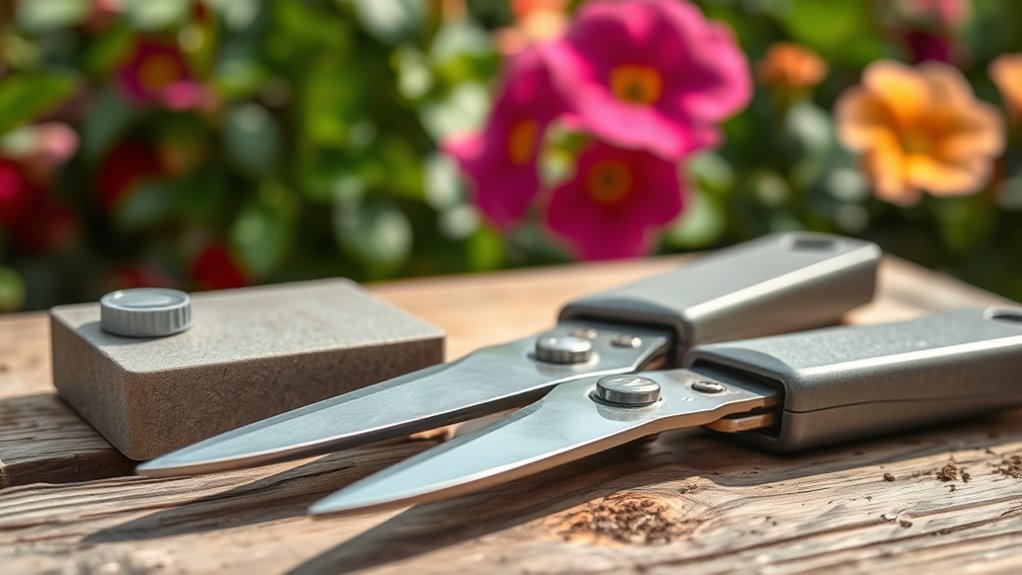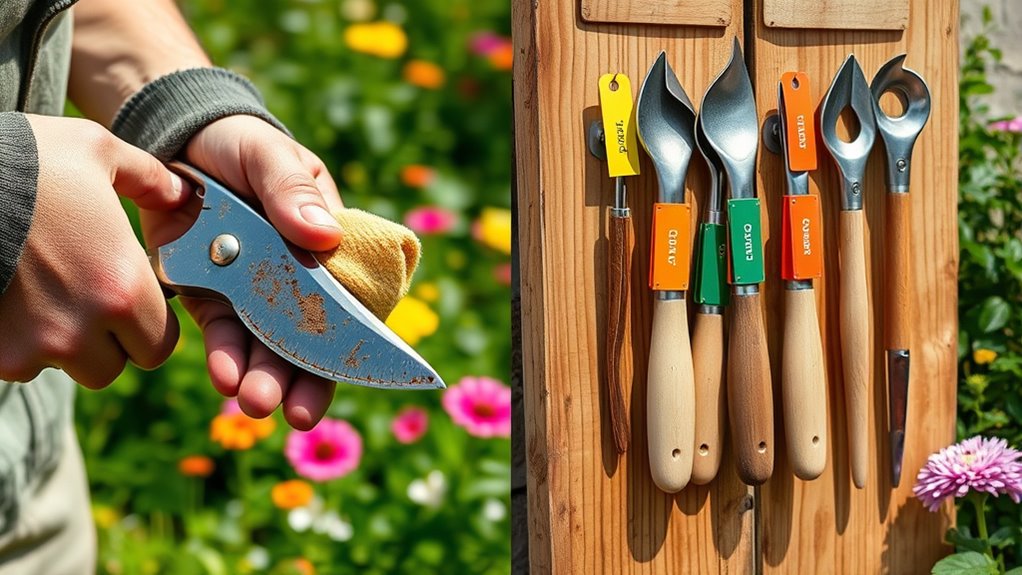To boost your garden tool care quickly, focus on cleaning and drying tools after each use to prevent rust, and sharpen blades regularly to keep them cutting efficiently. Store your tools properly on hooks or in bins to avoid damage and make them easy to find. Small changes like these can extend their lifespan and keep them performing at their best. Keep going, and you’ll discover even more simple tips to make your tools last longer.
Key Takeaways
- Wipe tools clean and dry after each use to prevent rust and corrosion.
- Regularly sharpen blades to maintain cutting efficiency and reduce strain.
- Store tools properly on hooks or in designated bins to prevent damage and clutter.
- Use blade covers or sheaths to protect sharp edges and ensure safety.
- Incorporate routine cleaning and maintenance into gardening habits for long-term tool health.
Keep Your Tools Clean and Dry After Use

After every use, make sure to wipe your garden tools clean and dry them thoroughly. This simple step is essential for good tool maintenance and rust prevention. Dirt and moisture left on your tools can lead to corrosion over time, weakening their effectiveness. Use a cloth or brush to remove soil, sap, and debris, paying attention to hard-to-reach areas. Dry your tools completely with a towel or rag to eliminate any lingering moisture. Proper cleaning and drying create a protective barrier against rust and extend your tools’ lifespan. Incorporating this habit into your gardening routine promotes preventative maintenance and helps avoid costly replacements. Consistent care now saves you money and effort later, ensuring your garden tools stay sharp, functional, and rust-free.
Sharpen Blades Regularly for Better Performance

Sharpening your garden tools’ blades regularly guarantees they cut efficiently and require less effort. Proper blade maintenance enhances cutting efficiency by ensuring tools stay sharp and effective. Dull blades strain your muscles and can damage plants. Use a sharpening stone or file to maintain a clean, precise edge, focusing on consistent angles. Regular sharpening prevents the buildup of rust and debris that can hinder performance. Keep blades free of dirt and sap before sharpening for better results. Check blades often, especially after heavy use or hitting tough materials. Sharp tools not only improve your efficiency but also reduce fatigue and increase safety. Dedicate a few minutes periodically to blade maintenance, and you’ll enjoy easier, cleaner cuts while extending the lifespan of your garden tools. Additionally, maintaining the overall textile line can help keep your tools in top condition and prevent unnecessary wear.
Store Tools Properly to Prevent Damage

Proper storage is essential to keep your garden tools in top condition and prevent unnecessary damage. Using effective storage solutions helps protect blades, handles, and mechanisms from rust, corrosion, and breakage. Consider hanging tools on sturdy hooks or wall-mounted racks to avoid clutter and minimize contact with dirt and moisture. Storing tools upright in a designated bin or toolbox keeps them organized and prevents unnecessary bending or warping. Organization tips like grouping similar tools together make it easier to find what you need and reduce mishandling. Keep sharp tools covered with protective sheaths or blade covers to prevent accidental cuts. Additionally, employing self-watering plant pots for garden plants can help maintain proper moisture levels, reducing the need for frequent watering and minimizing water-related wear on your tools. Consistent, proper storage extends the life of your tools and ensures they work efficiently when you need them most.
Frequently Asked Questions
How Often Should I Inspect My Garden Tools for Wear and Tear?
You should inspect your garden tools regularly, ideally after each use, to catch wear and tear early. Establish a consistent inspection schedule, such as weekly or bi-weekly, depending on how often you garden. Proper tool maintenance begins with these routine checks, allowing you to identify rust, loose parts, or dull blades. Regular inspections help prolong your tools’ lifespan and ensure they perform efficiently when you need them most.
What Type of Oil Is Best for Lubricating Garden Tools?
They say, “a stitch in time saves nine,” and that applies to garden tools too. The best garden oil for lubrication tips is lightweight, mineral-based oil or specialized tool oil. It penetrates well, prevents rust, and keeps tools functioning smoothly. Use a little, apply regularly, and wipe off excess to avoid dirt buildup. Proper lubrication extends your tools’ life and makes gardening easier and safer.
Can I Repair Rusted Tools Myself or Should I Replace Them?
You can definitely try DIY repairs on rusted tools if the damage isn’t too severe. Start by removing rust with a wire brush, then apply lubricant to prevent future corrosion. If the rust has caused significant structural damage or if the tool is beyond repair, it’s better to opt for tool replacement. Assess the extent of rust carefully; sometimes, replacing a tool is more cost-effective than attempting extensive repairs.
Are There Eco-Friendly Options for Cleaning Garden Tools?
Imagine your garden tools gleaming under the sun, eco-friendly choices making it possible. You can use biodegradable cleaners or natural disinfectants for cleaning your tools without harming the environment. These options are effective, safe, and gentle, ensuring your tools stay in top shape while protecting nature. By choosing natural solutions, you embrace sustainability and reduce chemical exposure, making your gardening routine more eco-conscious and healthier for both you and the planet.
How Do I Prevent Pests From Damaging Stored Garden Tools?
To prevent pests from damaging your stored garden tools, use pest-proof storage solutions like sealed containers or airtight sheds. Keep the area clean and dry, as pests thrive in damp conditions. You can also apply natural repellents like neem oil or garlic spray around your storage space to deter insects. Regularly inspect your tools, and make certain they are dry before storing, which helps keep pests at bay and prolongs your tools’ lifespan.
Conclusion
By keeping your tools clean, sharp, and properly stored, you’re nurturing a well-oiled machine that works effortlessly, like a symphony in harmony. These small tweaks are the seeds of lasting garden success, turning everyday chores into quick wins. With just a little effort, you’ll transform your garden tools from weary warriors to reliable allies, ensuring your gardening journey blooms with ease and efficiency. After all, a little care goes a long way in growing a thriving garden.









